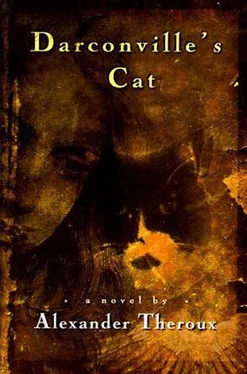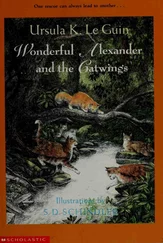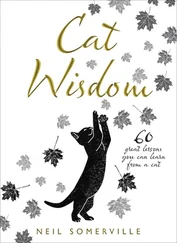“Mmmmm,” said Mrs. McAwaddle, breathing her hum back in, a sound more of fatigue than recognition.
“Thankfully nothing on Abraham Lincoln!” piped in Mrs. DeCrow, making a loud transition to the powder room.
Miss Sweetshrub chastely crossed her legs. “My most widely reviewed book? Difficult to say. I guess I’d have to say it was my Tlot! Tlot! The Biography of Alfred Noyes .”
“My,” said Mrs. McAwaddle, hooing low but wisely, like Minerva’s owl, “you’ve sure written a lot.”
“Permit me? A lot is a parcel of land. I have written”—she drew her little finger fastidiously across her eyebrow—”much.” Then she smiled around sweetly at everyone, especially Prof. Wratschewe whose approval was never in doubt if the handful of tiny white valentine candies (inscribed “Skidoo,” “Be Mine,” “Kiss Me,” etc.) he solicitously extended to her meant anything. For eleven years there had run the possibly not unfounded rumor they’d be married any weekend now — who knew, perhaps the five-hundred-and-seventy-third would be it?
“Good grief,” cried Prof. Wratschewe over his pocket-watch. “It’s late — and I’ve a lecture to prepare this weekend.”
“Weekends few,” sighed Miss Sally Bull Sweetshrub, recrossing her hands and anticipating, perhaps, only the title of another novel she’d one day write, one she saw somewhat wistfully that there’d be plenty of time for as she sat there silently, as if straining to hear the celesta of wedding bells she felt could now peal only across the landscape of her fiction.
And so it went.
The last rays of the afternoon sun brought a feeble light through the meeting-room, and Darconville, heading toward the doorway, found a last group of teachers to meet. He was introduced to Miss Ballhatchet, a muscular valkyrie from the physical ed department; Dr. Excipuliform, a history professor with afflicted eyes and a Transylvanian hop in his speech who despised the left-wing American press (“Intellectschultz! Velfare! Gummonism! Rewolt! Neekroes!”); cheery Miss Skait, from physics, who, immune to paradox, bouncingly assured him that Quinsy College was actually one big family; the Weerds — Aldo and Dodo — a young Pekinese-faced couple in the English department who spoke only to each other, wore rucksacks, and had occasional bouts of purpura haemorrhagica which they insisted on calling poetry; a six-foot maliarda named Miss Porchmouth, chemistry, who had a handshake that felt like pebbledash-siding; a certain Mr. Bischthumb, head of anthropology, who, tucking into an enormous piece of cake, bit off half the doily which got stuck in his weasand — and, wheezing tearfully, had to be raised by four men and lifted out of the room kicking skyward cataleptically in one of the most indecent postures Darconville had ever seen.
There were others. Darconville met Mr. Thimm, government department, who told him, several times, about his wife’s egg-in-the-armpit deformity; Drs. Knipperdoling and Pindle, two sententious ballachers from economic geography, who in a little vaudeville skit of theirs constantly pitched back and forth various adages and truisms about life, invariably beginning, “Well, I’ve learned one thing from the rough-and-tumble. .” or “Now, I’ve been shinnying up this old stick for forty some odd years, and. .”; and, finally, Dr. Speetles from the general education department, an anti-intellectual gepid who claimed the study of Skakespeare to be completely worthless, preferring instead the applied sciences and confessing wittily, “I teach all my classes, see, using only a toy fire-engine. It’s a multi-concept factor, you know? With this as a point of departure,” he said, sucking a candy-spangle from his thumb, “I can teach sociology, government, civics, visual and environmental studies — hell, you name it.” He tapped the side of his nose and nudged Darconville, who at that point was seriously on the brink of calling upon the angel, Hodniel, who supposedly had the power of curing stupidity in men. Instead, he put on his coat.
Walking out, one of the unaligneds of the faculty who may have stood, perhaps, for the several Darconville hadn’t yet managed to meet, confided to him, “You know, when ol’ Greatracks bangs down the gavel in these meetings and says, ‘Begin!’ well, I always think, shoot, that’s about the longest word in the damn books — and ain’t that the truth.”
The thought hadn’t been uttered a second when Prof. Wratschewe, grammarian, suddenly jumping-jacked out of nowhere and said, “Actually, I think you’ll find that the longest word found in literature, Aristophanic in origin, is: Lopadotemachoselacogaleokranioleipsano-drimhypotrimmatosilphioparaomelitokatakechymenokichlepikossypho-phattoperisteralektryonoptekephalliokigklopeleiolagoisiraiobaphetrago-nopterygn .”
Somehow, it summed up the day.
XIII A Lethiferous Letter
And, behold, there came a great wind from the wilderness.
— Job 1:19
Dear President Greatracks,
I feel I have made a mistake in coming to teach at Quinsy College. My intention here is not to sit in judgment, but your failure in my opinion to recognize the true ends of academic life — a circumstance I can’t yet believe you are disinclined to preserve — raises questions less to the extent than to the source of the trouble, and since I shall be foolish in saying more to this purpose, while trusting you to understand, may I trust with more reason to ask pardon for these remarks? We seem to have lost our way, becoming righteous rather than virtuous, rigid in form but lax in substance, and, not secondary but rather accessory to the urgency of my decision, reconciled to the old idea that vision is perilous where vision is profound, a fact leading not only to a singular want of refinement but to the kind of fatal ignorance, excusable only where it cannot be overcome, that has put us at variance with ourselves and advanced the cause of various griffon-like promoters and apparitors on the faculty whose names I would in all places esteem it an honor openly to abhor.
I have been forced by deliberation, therefore, to weigh advantage against loss in a matter touching not only my students and myself but also a book I am presently under obligation to complete, whence I here mean by conscience to advise you that, upon the firm setting of this persuasion, I believe it my duty to resign—
Thinking of Isabel, however, Darconville reconsidered and, running his great black pen over the words, registered a rainbow over the Universal Deluge.
XIV The Witchery of Archery
All myths are attempts to explain contradictions in nature.
— CLAUDE LEVI-STRAUSS
“FIRE!” cried Miss Ballhatchet, the forty-nine-year-old physical education teacher — her body, in the vintner’s phrase, orotund — and she waved her arms, megaphoning her way in a ballooning duck gym-suit through the front line of cherry-cheeked freshmen, their bows at the ready. Suddenly, she blew her whistle in a flutter of angry pips. “ Wait !”
“Must I repeat? The cock feather,” she fumed, her muscles tense, “must be at right angles to the nock and away from the bow! Miss Moss here must have thought I said left angles.” She glowered at Trinley Moss and pointed. “Is this what you mean by a left angle, or what?” The girl’s bow was canted ridiculously.
“Your bow is canted ridiculously.”
Miss Moss murmured.
Miss Ballhatchet again blew her whistle and closed her eyes. It had been broiling on the archery field earlier but the day had darkened by afternoon, a pewter-like sky settling in with full clouds. “Now, remember, a bow fully drawn is seven-eighths broken, hear?” She pointed, nose to nose, down the line. “This is a sport, I shouldn’t have to remind you, in which women have excelled — far better,” she snorted, “than men — for thousands of years, so shall we let up now, tell me? Well, we won’t, pure and simple.” She blew her whistle. “OK, go for your golds. Position! Aim! Draw!”—and, pausing dramatically, she pointed like a bellwether to the ten old targets (the broom-corn stuffing in each bulging out of the rips) which rose at one end of the long sward expanse like striped comic moons and boomed, “Fire!”
Читать дальше












